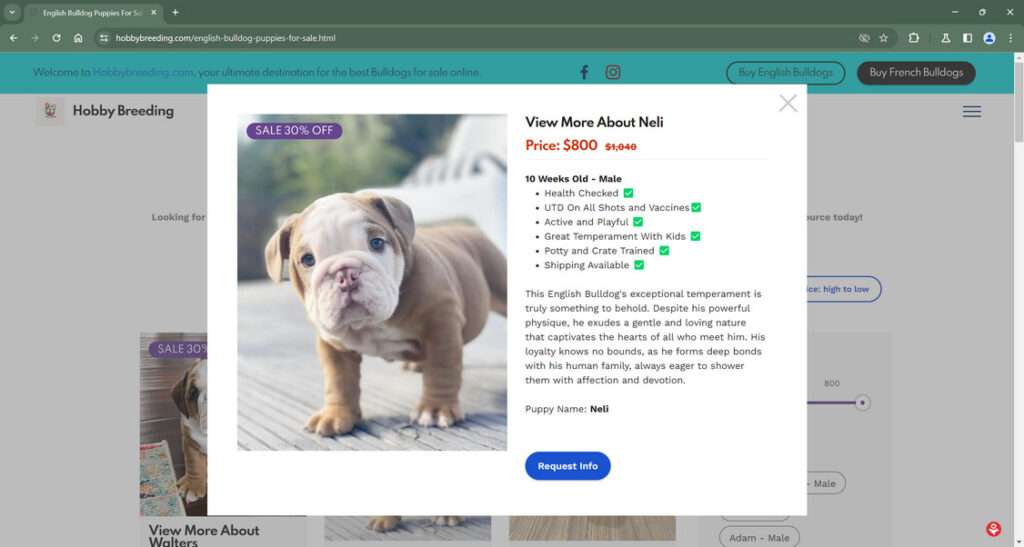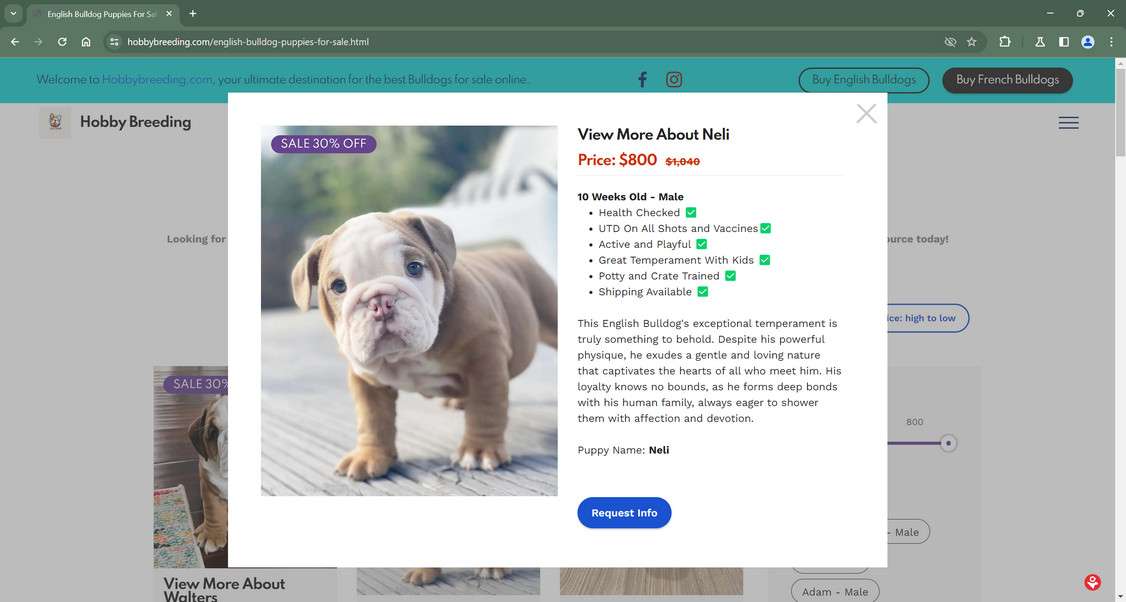Hobbybreeding.com is a fraudulent website that claims to sell puppies of popular dog breeds like French Bulldogs, English Bulldogs, and more. However, the website is an elaborate scam designed to steal money from unsuspecting victims looking to add a furry friend to their family. This detailed guide will provide an overview of how the scam works, tips on how to identify red flags, steps to take if you have fallen victim, and most importantly, how to avoid becoming a target of this cruel scheme.
- Overview of the Hobbybreeding Scam
- How the Hobbybreeding.com Scam Works
- What to Do if You Already Sent Money to Hobbybreeding
- How to Avoid Becoming the Victim of a Puppy Scam
- Frequently Asked Questions about Puppy Scams like Hobbybreeding.com
- The Bottom Line on Identifying and Avoiding Hobbybreeding Scams

Overview of the Hobbybreeding Scam
Hobbybreeding.com lures in potential victims through social media platforms like Facebook, Instagram and TikTok. Cute photos of puppies are used in advertisements posted on these sites along with messages indicating the puppies are for sale at incredibly low prices.
Once someone clicks on an ad, they are taken to the Hobbybreeding website which has a professional look and feel to it. The site contains dozens of pictures of adorable puppies of various breeds.
At the top, the site claims to be “Your One Stop for Bulldog and French Bulldog Puppies For Sale.” Further down, you’ll see full paragraphs explaining why you should choose Hobbybreeding and how they are reputable breeders dedicated to providing high quality and well-socialized pets.
If you scroll down, you’ll see listings for individual puppies for sale, complete with a name, photo, breed, gender and insanely cheap price ranging from $500-$800.
These low prices are purposefully listed to entice potential victims. The average price for a French Bulldog from a legitimate breeder ranges from $2,500-$5,000. English Bulldogs and other popular breeds have similarly high prices at ethical breeders.
Once a potential victim decides they want to purchase one of the puppies, they are instructed to fill out a form with their name, email, phone number, city, the name of the puppy they want, and a message.
After submitting the form, the scammers will contact the victim via phone or email and provide wiring instructions to send a deposit to “reserve” the puppy. They may ask for sums ranging from $200-$500.
Of course, once the money is sent, the scammers disappear. There are no real puppies for sale on Hobbybreeding.com. The photos have likely been stolen from legitimate breeders’ websites and the listings completely fabricated.
Some red flags that indicate Hobbybreeding.com is a scam:
- The prices are unrealistically low for purebred French Bulldogs, English Bulldogs and other popular breeds. This is a huge red flag.
- There is no verifiable contact information beyond an email address. No physical address, business registration or phone numbers are provided.
- The photos of the puppies are likely stolen from other sites. Reverse image searches reveal the same pictures on multiple puppy scam sites.
- There are numerous spelling and grammatical errors throughout the site copy. A legitimate business would have proper writing.
- They offer to ship the puppies, which legitimate breeders rarely do for young puppies.
- User reviews seem fabricated and too positive. There’s no way to verify their legitimacy.
By recognizing these red flags, you can help avoid becoming victimized by the Hobbybreeding.com scam and protect yourself from losing money in this scheme.
How the Hobbybreeding.com Scam Works
The operators of Hobbybreeding.com have developed an elaborate process to convince victims they are a legitimate company selling puppies online. Here are the typical steps victims go through when targeted by this scam:
1. The Initial Ad Draws Them In
The scam starts with an ad posted on social media like Facebook or Instagram. The ad contains cute photos of French Bulldog or English Bulldog puppies. Often times the photos even include young children holding or petting the puppies to further entice victims.
The ad copy promises puppies are for sale and ready to go home for very cheap prices like $500 or $800. There may be comments from fake accounts vouching for how they got a puppy and it was delivered safely. Some of the ads geographically target victims by mentioning their city or state in the copy.
For someone already searching for a puppy online, these ads can be incredibly enticing. The prices seem unbelievably good and commenters describe a smooth process.
2. The Slick Website Builds Trust
Once potential victims click on the social media ad, they are taken to the Hobbybreeding.com website. The site has a polished, professional look and feel that builds credibility in the eyes of visitors.
There is copy on the homepage explaining the business’s passion for breeding and commitment to providing exceptional puppies. Further down are dozens of listings for puppies of various breeds like Frenchies, English Bulldogs, Dobermans, Pomeranians and more.
Each listing contains a name for the puppy, gender, photo, breed and insanely cheap price ranging from $500-$800. There are additional pages described as an “About Us” page and “Contact” page to further legitimize the scam.
3. Visitors Inquire About Purchasing a Puppy
As visitors browse the listings of puppies on Hobbybreeding.com, they eventually decide on one they would like to purchase. The low prices listed seem like an unbelievable deal.
The website instructs them to fill out a form with their name, email address, phone number, city location and the name of the puppy they want. There is also a box to write a message to the seller.
They mention their interest in purchasing the puppy seen on the site, perhaps asking a question or two about pickup/delivery logistics based on the information presented. This form submission is sent directly to the scammers.
4. Scammers Follow Up and Request a Deposit
Soon after submitting the form, the scammers reach out to the victim posing as Hobbybreeding.com representatives. They respond via email or phone expressing excitement about the inquiry.
The scammers confirm the puppy is still available and can be delivered in exchange for a small deposit or fee. This is a critically important step, as the goal is to get funds from the victim.
They may claim the deposit is for initial veterinary fees, delivery costs, a holding fee or other seemingly legitimate reasons. The requested deposits range from $200 to as high as $1000.
5. Victims Pay the Deposit to the Scammers
Unfortunately, many victims are eager to secure their new puppy and don’t recognize the red flags. They wire over the deposit funds thinking it will hold the puppy for them.
The scammers provide wire transfer details or other payment methods to send the funds. Sometimes they use third party payment processors like Zelle or even gift card numbers. This makes it nearly impossible for victims to recoup the money once sent.
6. Scammers Disappear and Cut Off Contact
Once they have secured the deposit payment, the scammers disappear and stop responding to the victim. Their email addresses and phone numbers suddenly become invalid.
The Hobbybreeding.com website may completely vanish as well. Of course, no puppy is ever shipped and the scammers make off with the deposited money, leaving the victim confused, heartbroken and out of funds.
By following these calculated steps, scammers behind sites like Hobbybreeding.com are able to convince even skeptical individuals that their business is legitimate. Avoid becoming their next victim by recognizing how these schemes work.
What to Do if You Already Sent Money to Hobbybreeding
Unfortunately, many innocent folks have already been duped by the Hobbybreeding.com scam and lost money. If you already sent funds to them and never received a puppy, here are the steps you should immediately take:
- Call your bank and report fraudulent activity on your card or account. If you sent money recently via wire, bank/wire transfer, gift cards or other traceable means, call your bank and explain it was fraud. Your bank may be able to stop, refund or do a chargeback on the transaction to get your money back.
- Report the scam to authorities. File reports about the scam with the FBI Internet Crime Complaint Center (IC3), FTC, state attorney general and local police so they can investigate the scheme further. Provide them with all details of your experience.
- Warn your friends and social media connections. Make posts warning your family, friends and followers on social media about the scam. Share your experience and suggest they avoid Hobbybreeding.com to prevent others from being victimized.
- Review the site on scam reporting sites. Look up Hobbybreeding.com on scam reporting sites like Ripoff Report and leave a review describing your experience. This will warn other potential victims performing searches about the fraud.
- Consult with an attorney. For large amounts lost, consider consulting an attorney to review your options. An attorney can help formally request info from money transfer services and evaluate legal strategies.
- Be wary of recovery scams. Beware of any calls claiming they can recover lost funds for an upfront fee. This is a common scam targeting victims of fraud. Never pay an upfront fee – legitimate recovery assistance would work on a contingency.
While recovery efforts may not always lead to you recouping lost money, taking these proactive steps can help shut down Hobbybreeding’s operation and prevent future innocent victims.
How to Avoid Becoming the Victim of a Puppy Scam
The Hobbybreeding.com scam reveals the importance of being diligent when searching for a new pet online. Follow these tips to identify fraud and find a legitimate source for your furry friend:
- Avoid “too good to be true” prices – Extremely cheap purebred puppies are almost always a red flag for scams. Research the breed to understand true market prices.
- Beware classified sites and social media ads – Scammers flock to Craigslist, Facebook, Instagram and TikTok to post fake pet ads loaded with stock photos. Verify sellers extensively before sending any money.
- Search for local breeders – Look up breeders based within driving distance of your location. Visiting in person helps verify legitimacy and health of animals.
- Ask for veterinary records – Request evidence like veterinary reports, microchip details and health clearances before purchasing a pet. Scammers won’t have this info to provide.
- Seek phone/video conversations – Have actual voice and video conversations over the phone or video chat to vet sellers. Look for inconsistencies and avoid those unwilling to hop on a call.
- Avoid wire transfers or gift cards – Wiring money or buying gift cards are common scam red flags. Use a credit card when possible for the ability to dispute fraudulent charges.
- Search online for reviews – Look up the business name, phone numbers and emails online to check for any scam reports tied to them. Be wary of review sites created by the scammers.
- See the animal prior to paying – Never pay for a pet you haven’t seen in person. A seller who demands payment upfront without showing an animal is a huge red flag.
Performing due diligence protects you from sending money to scams like Hobbybreeding.com. There are ethical breeders and shelters ready to match you with your perfect pet – it just takes research to find them.
Frequently Asked Questions about Puppy Scams like Hobbybreeding.com
Searching for a new furry friend online can be exciting, but it also carries risks. Puppy scams are widespread, designed to prey on eager buyers looking to add a dog to their family. This FAQ will answer common questions about identifying and avoiding puppy scams like Hobbybreeding.com to help protect your money and heart from frauds.
What is the Hobbybreeding.com puppy scam?
Hobbybreeding.com is a fraudulent website claiming to sell purebred puppies of popular breeds at unbelievably cheap prices, often ranging from $500 to $800 per pup.
Photos of adorable puppies are used alongside fake testimonials to make the site look credible. However, it is an elaborate scam. Victims are instructed to fill out a form and pay a deposit to “reserve” a puppy, but no puppy is ever provided. The scammers take the money and disappear.
How can I identify puppy scams like Hobbybreeding.com?
There are several red flags that indicate a website selling puppies online is likely a scam:
- Extremely cheap prices below $1,000 for purebred, popular puppies
- No verifiable physical address, business registration or working phone number
- Photos of puppies that reverse image searches show copied from other sites
- Requests for wire transfers, gift card payments, Western Union, etc.
- Claims of readily shipping young 8-10 week old puppies
- Inability or refusal to have a real-time video chat before purchase
- Poor grammar/spelling errors throughout the website
If a site selling puppies online has one or more of these red flags, it is likely a scam designed to steal your money.
What should I do if I already sent money to Hobbybreeding.com?
If you already sent money to Hobbybreeding.com or a similar online puppy scam, take these steps immediately:
- Contact your bank to report fraudulent charges and request a chargeback if applicable
- File reports about the scam with the FBI IC3, FTC, state attorney general, and local police
- Warn others about the scam by reporting it on watchdog sites like Ripoff Report
- Consult with an attorney about legal options for recovering lost funds
- Avoid any companies asking for upfront fees to recover your money, as those are scams too
While it may be difficult to get funds returned, taking action can potentially help and prevents future victims.
How can I safely buy a puppy online?
To safely buy a puppy online, follow these tips:
- Research prices from ethical breeders to avoid “too good to be true” costs
- Only work with local sellers within driving distance that allow in-person visits
- Ask for and verify veterinary records, microchip details, lineage info, etc.
- Have multiple video chats with the seller to ask questions and see the actual puppy
- Never purchase a puppy without seeing it in person first
- Avoid wire transfers, gift cards and cash; use a credit card when possible
Taking these precautions allows you to thoroughly vet sellers and avoid sending money to scams.
Where can I report puppy scams to help warn others?
If you come across a puppy scam website, help protect others by reporting the site:
- Report it to the FBI’s Internet Crime Complaint Center at IC3.gov
- File a complaint with the FTC at ReportFraud.ftc.gov
- Report it to petscams.com, a watchdog site documenting online puppy scams
- Leave online reviews about your experience on consumer sites like Ripoff Report and BBB
- Warn your friends/family personally if you see puppy scam ads on their social media feeds
The more people that report puppy scams, the quicker these fraudulent sites can be shut down.
What are some trustworthy places I can get a puppy online?
Some reputable places to find puppies online include:
- American Kennel Club Marketplace – breeders must follow AKC standards
- Local animal shelters and rescue organizations via Petfinder or Adoptapet
- Reputable breed-specific rescues like Pug Rescue or Doberman Rescue
- Carefully vetted local breeders through recommendations and research
Avoid classified sites like Craigslist or social media ads promoting puppies. Only work with sources you can thoroughly research, speak with extensively, and ideally visit in person. This helps avoid falling victim to puppy scams.
The Bottom Line on Identifying and Avoiding Hobbybreeding Scams
In summary, Hobbybreeding.com and sites like it should be avoided at all costs when searching for a new pet online. Here are the key takeaways to remember:
- Puppy scams like Hobbybreeding use social media ads and fake breeder websites listing dogs at unrealistically cheap prices to lure in and deceive victims.
- Asking for deposits and payments via wire transfer or gift cards are common tactics scammers use before disappearing once money is sent.
- Anyone who believes they are victim should immediately call their bank, report the fraud to authorities, and consult professionals about recovery options.
- Finding pets from legitimate, local sources you can meet in-person is the safest way to avoid online puppy scams in the future.
- Being vigilant about asking for veterinary proof, having conversations, and watching for “too good to be true” prices can protect you from sending money to frauds.
By being an educated and skeptical consumer, you can avoid the heartbreak and financial damage these puppy scams create. Search for your new furry friend safely and only work with reputable local breeders or shelters you can fully vet.




